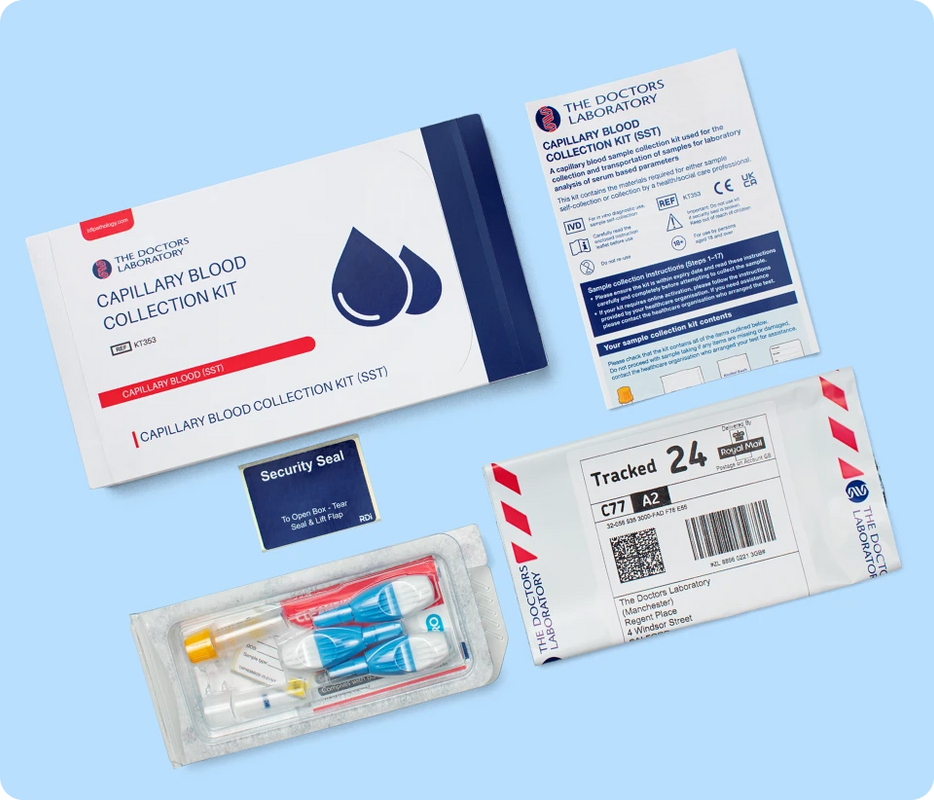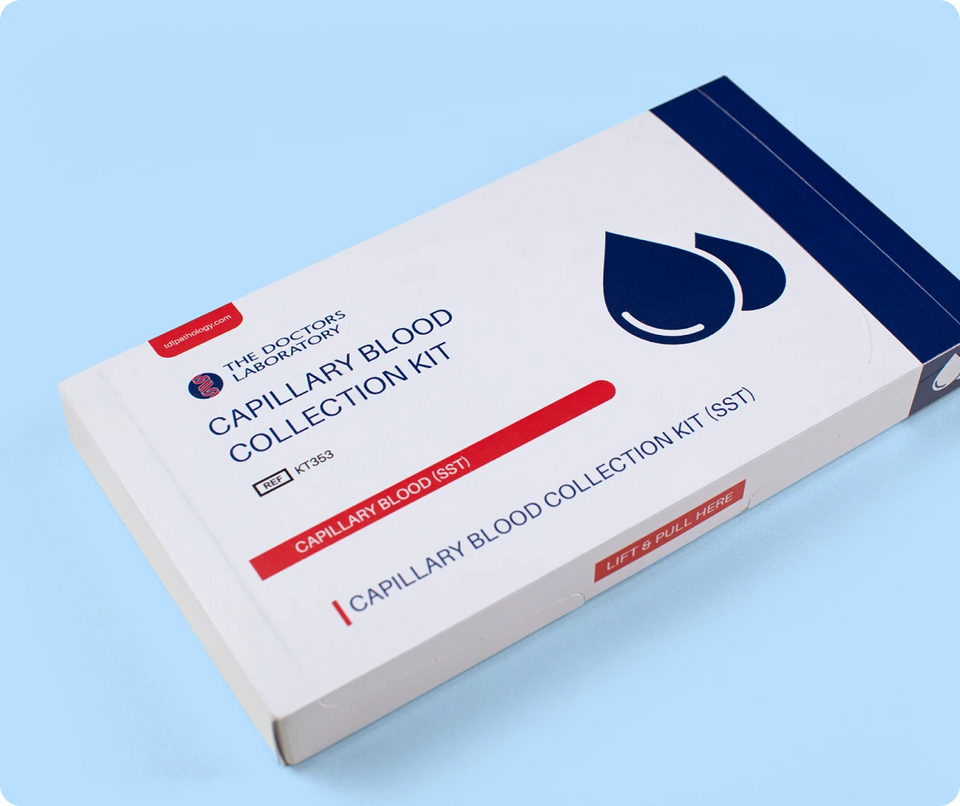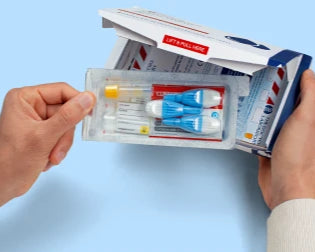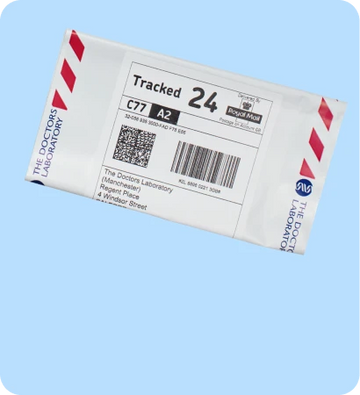Prostate Cancer Screening Test
PSACheck, the easy, accurate, and private at-home screening test for early prostate cancer detection for men aged 40+.
- Simple at-home blood collection kit: Convenient and non-invasive. Just collect a small blood sample with a quick and easy finger-prick test.
- No doctor’s appointment needed: Test from home with ease.
- Expert advice & support: Guidance from clinical professionals to help you understand your risk and next steps.
- Fast & reliable results: Your sample is tested in accredited UKAS & ISO 15189 laboratories, with secure results in just five days.


Request callback
Please ensure you have read and agree to our privacy policy before submitting your request.

Why prostate screening?
Early detection saves lives – Identifying changes in PSA levels can help catch prostate cancer early.
Prostate cancer is the most common cancer in men in the UK, with 1 in 8 men diagnosed in their lifetime. Identifying elevated PSA (Prostate-Specific Antigen) levels early can help detect prostate cancer before symptoms appear, and outcomes.
Check4Cancer's at-home Prostate Cancer Screening Test is a clinically validated PSA test that helps detect changes in prostate health. It measures free and total PSA values and is designed for men without symptoms who want to screen accurately from the comfort and privacy of home.
Why choose Check4Cancer for your prostate cancer screening test?
When it comes to prostate cancer screening, not all providers offer the same level of service or tests that are appropriate for prostate screening. This is what sets us apart from other providers, ensuring you receive the highest standard of support and clinical care.
Cancer screening services from cancer experts
Free to total PSA values measured to help differentiate benign from malignant causes*.
All abnormal results eligible for onward referral to healthcare professional (including NHS).
Kits tested for usability and stability in accordance with UKCA accreditation standards.
Kits issued within 1 working day with results provided within 5 days of return.
Tests analysed in UK accredited laboratories.
Abnormal results delivered via telephone call from cancer nurses to allow for your questions; reduce anxiety and provide signposting for where to go next.

The benefits of an at-home prostate screening test
Convenience and privacy
A home kit means no hospital visits and no waiting rooms. You can enjoy the privacy and ease of testing from your own home. Clear instructions make it simple to collect your sample and return it promptly.
Reassurance for peace of mind
Even if you feel healthy, regular screening can confirm your well-being. Should the test detect abnormalities, our clinical team will call you and provide full support for follow-up tests and consultations.

Who should consider prostate cancer screening?
Prostate cancer risk increases with age and other factors, making early screening important for those at higher risk. This test is ideal for:
Men aged 40 and above
who want to monitor their prostate health.
Those with a family history of prostate cancer
(father or brother diagnosed under 60).
Black African and Black Caribbean men,
who are known to have a higher risk.
Anyone seeking peace of mind
with a fast, confidential PSA test.
FAQs
What is a PSA Test?
Is PSA a good measure for diagnosing prostate cancer?
What are total and free PSA levels?
What can give you a raised PSA result?
How accurate is PSACheck?
*Is the Free-to-Total PSA ratio included in all results?
How to use our prostate cancer screening test at home
Screening for prostate cancer at home is fast and straightforward. Here’s how it works:


2. Collect your sample: Use the finger-prick blood test kit provided.

3. Secure the sample: Package it safely in the sealed container provided.

4. Package and return: Use the prepaid, discreet packaging to send your sample to our certified laboratory.

5. Get your results: Receive your results within five working days via a secure delivery system.
This process is private, easy to follow, and designed to give you clarity and peace of mind.
Reviews/Testimonials

Professor Richard Hindley
Clinical Advisor for Prostate Cancer
Consultant Urologist at Hampshire Hospitals. Visiting Professor at the department of Health & Wellbeing at the University of Winchester Richard Hindley is a Consultant Urologist at Hampshire Hospitals and was appointed in 2014. In 2017 he was awarded a visiting Professor position working with the Department of Health and Wellbeing at the University of Winchester. This was in recognition of his growing prostate research portfolio which includes collaborating with other units including UCLH and the University of Oxford. He was privileged to be involved with the PROMIS and PRECISION trials, which have changed forever the diagnostic pathway for men with suspected prostate cancer. He has publications in both the Lancet at the NEJM. His interests relate not only to prostate cancer diagnostics but also focal therapy as a treatment option for men with intermediate risk prostate cancer, as well as minimally invasive treatments for benign prostatic obstruction and men’s health issues in general.
Find out moreKnowledge and support
Go to all articles


PODCAST: Why employers can’t ignore cancer screening
Cancer screening is increasingly recognised as a critical workforce issue, as rising incidence rates and stretched NHS diagnostic capacity place...
Read more
